[2012] 47 vst 116 (cestat) - RS Goyal & Associates
[2012] 47 vst 116 (cestat) - RS Goyal & Associates
[2012] 47 vst 116 (cestat) - RS Goyal & Associates
You also want an ePaper? Increase the reach of your titles
YUMPU automatically turns print PDFs into web optimized ePapers that Google loves.
VATLaws (Readable Version) - Tuesday, November 27, <strong>2012</strong><br />
[<strong>2012</strong>] <strong>47</strong> VST <strong>116</strong> (CESTAT)<br />
[CUSTOMS, EXCISE AND SERVICE TAX APPELLATE TRIBUNAL]<br />
(NEW DELHI BENCH)<br />
Gaytri Construction Co.<br />
Commissioner of Central Excise, Jaipur<br />
V.<br />
ASHOK JINDAL JUDICIAL MEMBER AND MATHEW JOHN TECHNICAL MEMBER<br />
September 27 2011<br />
HF ♦ Assessee, including dealer (Registered or Unregistered)<br />
SERVICE TAX — CARGO HANDLING SERVICE — ACTIVITIES OF SHIFTING OF COAL FROM POWER<br />
PLANT TO CEMENT PLANT WITHIN FACTORY PREMISES, SHIFTING OF CEMENT FROM FACTORY TO<br />
STORAGE PLACE WITHIN FACTORY PREMISES AND LOADING OF CEMENT BAGS INTO TRUCKS AND<br />
RAILWAY WAGONS USING MECHANICAL APPLIANCES — NOT CARGO HANDLING SERVICES —<br />
FINANCE ACT (32 OF 1994), S. 65(23), (105)(ZR).<br />
SERVICE TAX — LIMITATION — BONA FIDE BELIEF THAT ASSESSEE’S ACTIVITIES DID NOT FALL<br />
UNDER CARGO HANDLING SERVICES — EXTENDED PERIOD OF LIMITATION NOT AVAILABLE —<br />
FINANCE ACT (32 OF 1994), S. 73.<br />
The appellants were engaged in providing certain services to S for assisting in loading of cement bags from<br />
storage yard to wagon/truck using mechanized equipments. In the case of loading from platform to wagon, S<br />
was paying service tax from the beginning. The appellants were also engaged in shifting of coal from power<br />
plant to cement plant within the factory premises of S and also in shifting of the final product, viz., cement, from<br />
the factory to a proper storage place within the factory premises. The Revenue was of the view that those<br />
activities were taxable under cargo handling service and show-cause notice was issued proposing levy on<br />
such services rendered during the period from August 16, 2002 to September, 2005. The adjudicating authority<br />
confirmed the demand along with interest and penalty under the Finance Act, 1994. An appeal filed before the<br />
Commissioner was rejected. On further appeal:<br />
Held, allowing the appeal, that shifting of goods within the factory premises would not come within the scope of<br />
cargo handling services. Therefore the activity of the appellants in shifting of coal from power plant to cement<br />
unit or shifting of final product, viz., cement, within the factory premises could not fall within the definition of<br />
”cargo handling services”. Handling of goods using conveyor system also would not fall within the definition of<br />
“cargo handling service”. Therefore, loading of cement bags into trucks and railway wagons by the appellants<br />
using mechanical appliances would not fall within the definition of “cargo handling services”. Modi Construction<br />
Co. v. CCE [2008] 18 VST 125 (CESTAT-Kol) followed.<br />
S.B. Construction Company v. Union of India [2006] 4 STR 545 (Raj) relied on.<br />
Held also, that essentially the contract was for shifting of cargo within factory premises and the appellant had a<br />
bona fide belief that it was not “cargo handling service” as defined in the Finance Act, 1994. Therefore the<br />
extended period of limitation was not available.<br />
Final Order No. ST/546 of 2011, Service Tax Appeal No. 102 of 2008 decided on September 27<br />
2011<br />
This copy was printed from VATLaws licensed to: R.S. <strong>Goyal</strong>
VATLaws (Readable Version) - Tuesday, November 27, <strong>2012</strong><br />
Mayank Garg, Advocate, for the appellant<br />
Sunil Kumar, Departmental Representative, for the respondent<br />
Cases referred to :<br />
Modi Construction Co. v. CCE [2008] 18 VST 125 (CESTAT-Kol) followed<br />
S.B. Construction Company v. Union of India [2006] 4 STR 545 (Raj) relied on<br />
Associated Pigments Ltd. v. Superintendent of Central Excise [1993] 68 ELT 514 (Cal) referred to<br />
Commissioner of Central Excise v. Surinder Kumar [2010] 20 STR 678 (Tri.-Delhi) referred to<br />
Gajanand Agarwal v. Commissioner of Central Excise [2009] 13 STR 138 (Tri.-Kolkata) referred to<br />
J & J Enterprises v. Commissioner of Central Excise [2005] 186 ELT 189 (Tri.-Delhi) referred to<br />
Modi Construction Co. v. CCE [2008] 18 VST 125 (CESTAT-Kol) referred to<br />
Pahwa Chemicals Pvt. Ltd. v. CCE [2005] 189 ELT 257 (SC) referred to<br />
Renu Singh & Co. v. Commissioner of Custom & Central Excise [2007] 7 STR 397 (Tri.-Bang)<br />
referred to<br />
S.B. Construction Company v. Union of India [2006] 4 STR 545 (Raj) referred to<br />
--------------------------------------------------<br />
ORDER<br />
MATHEW JOHN (Technical Member).—During August, 2002 to September,<br />
2005, the appellants were engaged in providing certain services to<br />
M/s. Shriram Cement Works ("SCW", for short) for assisting in loading of<br />
cement bags from storage yard to wagon/truck using mechanized equipments.<br />
They were also engaged in shifting of coal from power plant to<br />
cement plant within the factory premises of SCW and also in shifting of the<br />
final product, viz., cement from the factory to a proper storage place within<br />
the factory premises. The appellants state their activities as under:<br />
"(a) Loading of cement bags into trucks and railway wagon<br />
That M/s. Shriram Cement Works has a mechanized plant for<br />
loading of cement bags at the company site. They required manpower<br />
for managing various points in the mechanized process. All the activities<br />
are done mechanically by machinery and conveyor belt owned<br />
by the cement manufacturer, i.e., M/s. SCW. The loading job is fully<br />
automated and the manpower supplied by the appellant is related to<br />
only supplementing the mechanized process of loading of cement<br />
bags. The labourers provided by the appellant stand at different place<br />
in the mechanized process. The loading job are carried out through<br />
conveyor system which takes these bags to the exit point that goes<br />
right into/or wagon (sic., truck or wagon). At the exit point, the<br />
labourers simply give a helping push to the bags whenever necessary<br />
so that it falls in place and bags are properly stacked. Since labour<br />
supplied by the appellants is just supplementing the job of loading of<br />
cement bags into trucks/railway wagon, the services carried out by the<br />
appellant do not fall under the cargo handling services. The case is<br />
squarely covered by the judgment passed in the case of J & J Enterprises<br />
v. Commissioner of Central Excise, Raipur reported in [2005]<br />
186 ELT 189 (Tri.-Delhi) and the Renu Singh & Co. v. Commissioner<br />
of Custom & Central Excise, Hyderabad [2007] 7 STR 397 (Tri.-Bang).<br />
Under this head, the appellants have received the total payment of<br />
This copy was printed from VATLaws licensed to: R.S. <strong>Goyal</strong><br />
Page No: 117
VATLaws (Readable Version) - Tuesday, November 27, <strong>2012</strong><br />
Rs. 11,90,653 during the disputed period.<br />
(b) Internal shifting of goods<br />
The appellants have also shifted the packed cement bags from<br />
packing plant to railway platform, unloaded the cement bags from<br />
godown to storage yard at railway platform including stacking<br />
properly, shifted the cement filled bags from packing plant to silver<br />
cement godown using own truck where loading will be done by the<br />
company, shifted the packed cement bags within the platform and<br />
re-stacking, transporting/shifting the cement bags within the platform<br />
and shifting of cement bags from platform from one place to another.<br />
All these activities were carried out within the factory premises and<br />
therefore called as internal shifting of goods and being these goods<br />
are shifted within the factory premises, the goods cannot be<br />
construed as goods meant for transportation. Company has signed a<br />
different agreement for loading of cement bags to truck and railway<br />
wagon with several contractors including the appellants and it is not<br />
Page No: 118<br />
necessary that finally the appellants will carry out the job of loading of<br />
these cement bags into the trucks or railway wagon and therefore<br />
such services are distinguishable from the work of loading of cement<br />
bags of goods meant for transportation and therefore the job of internal<br />
shifting of goods are clearly outside the purview of cargo handling<br />
services. Under this head, the appellants have received the total<br />
payment of Rs. 19,25,064 during the disputed period.<br />
(c) Shifting of coal from power plant to cement plant<br />
The appellants have also carried out the job of shifting of coal<br />
from power plant to cement plant, breaking of big lumps of coal and<br />
cleaning of crusher jail, etc. These activities are in the nature of<br />
handling of material within the factory premises and these materials<br />
are not meant for transportation. The coal was not transported out of<br />
the premises of SCW and consequently no document of title is raised<br />
for any party. The appellants have carried out the entire job within<br />
the factory premises and only a meagre amount not exceeding<br />
Rs. 10,000 was charged for transporting of coal from power plant to<br />
Jagpura which is outside the factory premises. The coal was shifted<br />
using loader machine and dumper and such (sic as such) the appellants<br />
have performed the work of internal transportation only which<br />
was specifically excluded under the head of cargo handling services.<br />
Further under the agreement no relationship of bailor of bailee exists<br />
between the parties and being the goods are not transported outside<br />
the factory premises no documents of title is raised for any party. In<br />
this case also being the goods were shifted within the factory<br />
premises from power plant to cement plant and such goods are not<br />
meant for transportation outside the factory premises and, therefore,<br />
such goods do not come in the definition of 'cargo' and, therefore, the<br />
services provided by the appellants are not covered under the CHS.<br />
Under this head, the appellants have received the total payment of<br />
Rs. 28,52,917 during the disputed period.<br />
The total payment received against each category of services as<br />
referred above during the period under appeal is given in annexure 3<br />
enclosed. The service recipient has also certified the nature of jobs<br />
This copy was printed from VATLaws licensed to: R.S. <strong>Goyal</strong>
VATLaws (Readable Version) - Tuesday, November 27, <strong>2012</strong><br />
carried out by the appellants and the copy of the certificate given by<br />
the service recipient is enclosed as annexure 4."<br />
The Revenue is of the view that the above activities are taxable under the<br />
entry for "cargo handling service" as defined under clause (zr) of section<br />
65(105) of the Finance Act, 1994 and clause (23) of section 65 of the<br />
Finance Act, 1994. These are reproduced below:<br />
Page No: 119<br />
"65. (105)(zr) 'Taxable service' means any service provided or to be<br />
provided to any person, by a cargo handling agency in relation to<br />
cargo handling services.<br />
65. (23) 'Cargo handling service' means loading, unloading,<br />
packing or unpacking of cargo and includes cargo handling services<br />
provided for freight in special containers or for non-containerized<br />
freight, services provided by a container freight terminal or any other<br />
freight terminal, for all modes of transport and any other services<br />
incidental to freight but does not include handling of export cargo or<br />
passenger baggage or mere transportation of cargo."<br />
Show-cause notice issued on February 20, 2006 proposing levy of tax on<br />
such services rendered during the period August 16, 2002 to September,<br />
2005 was adjudicated by the adjudicating authority confirming a demand of<br />
Rs. 4,39,346 along with appropriate interest. Further, penalties under<br />
sections 75, 76, 77 and 78 of the Finance Act, 1994 were also imposed.<br />
Aggrieved by the order of the Commissioner (Appeals), the appellants filed<br />
an appeal before the Commissioner of Central Excise (Appeals) who<br />
rejected the appeal. Aggrieved by the order of the first appellate authority,<br />
the appellants have filed this appeal before the Tribunal. The main<br />
contention of the appellants is that when the goods are moved within the<br />
factory premises, such goods cannot be considered as cargo<br />
because "cargo" means something to be transported in different modes of<br />
transport like truck, rail, ship or aircraft and when goods are shifted from<br />
one location to another location inside factory premises such goods cannot<br />
be considered to be cargo. They relied on the following decisions of the<br />
Tribunal in the matter:<br />
(i) Modi Construction Co. v. CCE, Ranchi [2008] 18 VST 125 (CESTAT-<br />
Kol); [2008] 12 STR 34.<br />
(ii) Commissioner of Central Excise, Meerut I v. Surinder Kumar<br />
[2010] 20 STR 678 (Tri.-Delhi).<br />
So the appellants argue that there cannot be any dispute that the activity<br />
of shifting of coal from power plant to cement unit or shifting of final<br />
product, viz., cement within the factory premises cannot fall within the<br />
definition of "cargo handling services".<br />
In the matter of loading of cement bags into trucks and railway wagon<br />
using mechanical appliances the appellants rely on the decision of the<br />
honourable Rajasthan High Court in the matter of S.B. Construction<br />
Company v. Union of India reported in [2006] 4 STR 545 (Raj). They rely on<br />
paragraphs 7, 8, 9 and 10 of the order which are re-produced below:<br />
Page No: 120<br />
This copy was printed from VATLaws licensed to: R.S. <strong>Goyal</strong>
VATLaws (Readable Version) - Tuesday, November 27, <strong>2012</strong><br />
"7. We have heard learned counsel for the parties and perused the<br />
pleadings. In order to appreciate the controversy involved it will be<br />
necessary to look into the actual nature of job assigned to the petitioner-firm,<br />
which has been placed on record as annexure 3. It clearly<br />
appears that the fourth respondent gave contract to the petitionerfirm<br />
for unloading the coal from railway wagon to boiler bunkers of<br />
the thermal power station. The contract has been awarded for<br />
unloading of coal through WT system, stacking/reclaiming of coal to<br />
S/R system and feeding of coal to boiler bunkers through conveyor<br />
system. For the convenience it can be divided into two parts as<br />
follows:<br />
'(i) Unloading of coal from railway wagons through wagon<br />
tippling system and feeding to boiler bunkers of all the units through<br />
conveyor system, as required,<br />
(ii) Transportation of picked up coal/stones, manual unloading<br />
and stacking thereof.'<br />
8. The scope of the said work has been summarized by the<br />
petitioner as under:<br />
- Unloading of coal from railway wagons through tippling<br />
system/manual unloading system.<br />
- Feeding of coal into the bunkers of all the units either from<br />
wagon tipplers or from coal stacked at the stockpile area.<br />
- Feeding of coal to stockpile area from wagon tipplers through<br />
stacker/reclaimer.<br />
- Collecting spilled coal from various conveyors, galleries, buildings,<br />
bunker floors, rail track area and putting on the near by<br />
conveyors for feeding to bunkers or stacking in stock-pile area.<br />
- Collecting spilled coal from various buildings/below the<br />
conveyor galleries/bunker floor, etc., and transporting and<br />
stacking the same to stock-pile area at the location to be<br />
decided by the engineer incharge.<br />
- Segregating coal from the refuse dump house and transporting<br />
and stacking to the stock-pile area at the location to be decided<br />
by the engineer-incharge.<br />
- Transportation and stacking of stones from refuse dump<br />
house/ground floor of bunkers/bunker floor/conveyors/TP's/<br />
buildings or any other location to the specified area in the<br />
thermal plant.<br />
Page No: 121<br />
9. At this stage, it will be relevant to refer to definition clause which<br />
defines 'taxable services' and particularly 'cargo handling services' as<br />
under:<br />
'Clause (90) "taxable service" means any service provided,—<br />
This copy was printed from VATLaws licensed to: R.S. <strong>Goyal</strong>
VATLaws (Readable Version) - Tuesday, November 27, <strong>2012</strong><br />
(zr) to any person by a cargo handling agency in relation to cargo<br />
handling services.'<br />
The dictionary meaning of word 'cargo' defined in various<br />
Dictionaries is as under:<br />
Webster's Dictionary:<br />
'Cargo'—Goods and merchandise taken on abroad, vessel, aircraft,<br />
etc.<br />
Websters IX New Collegiate Dictionary:<br />
'Cargo'—Goods or merchandise conveyed in ship, aeroplane or<br />
vehicle.<br />
Thus, it is evident that word 'cargo' means carriage of luggage in<br />
ship, vessel or aircraft.<br />
10. In the instant case, the coal is handled/moved from railway<br />
wagons to the site of thermal power station with the aid of wagon<br />
tippling system to be fed in the boiler bunkers through conveyor<br />
system. It is evident that handling of the coal is done through wagon<br />
tippling system or conveyor system, they are mechanical devices and<br />
no motor vehicle is involved in the said handling. The clarification<br />
made by the CBEC also supports the petitioner's contention. It clearly<br />
appears that the service tax has been levied under the 'cargo<br />
handling', on such services which undertake the activities of packing,<br />
unpacking, loading, unloading of goods to be transported by any<br />
means of transportation, namely, truck, rail, ship or aircraft. In the<br />
instant case the service provided by the petitioner-firm under the<br />
contract is distinct, i.e., transporting coal from wagons to thermal<br />
power station by conveyor belt and not by any means of transportation.<br />
Thus, we are of the view that the service rendered by the<br />
petitioner under the subject contract does not fall under the ambit of<br />
cargo handling services and as such it is not liable to pay the service<br />
tax."<br />
The appellants point out that in the case of S.B. Construction Company<br />
[2006] 4 STR 545 (Raj), the cargo which came by railway wagon was being<br />
unloaded using a mechanised system to a factory and the High Court<br />
decided that such services will not come within the ambit of "cargo<br />
Page No: 122<br />
handling services". The appellants point out that they were doing exactly<br />
the same type of activity but while despatching the goods from the factory<br />
premises to the consumers of cement. Therefore, it is argued that the<br />
decision of the Rajasthan High Court in the abovesaid case will apply with<br />
equal force to the facts and circumstances of the case of the appellants.<br />
The appellants have a further case in the matter of time-bar. They<br />
contest that they did not suppress any information from the Department<br />
with intent to evade payment of tax. They argue that unless there is a<br />
positive act on the part of the assessee to suppress information, extended<br />
period cannot be invoked. They rely on the decision of the Tribunal in the<br />
case of Associated Pigments Ltd. v. Superintendent of Central Excise<br />
[1993] 68 ELT 514 (Cal) and the decision of the Supreme Court in the case<br />
This copy was printed from VATLaws licensed to: R.S. <strong>Goyal</strong>
VATLaws (Readable Version) - Tuesday, November 27, <strong>2012</strong><br />
of Pahwa Chemicals Pvt. Ltd. v. CCE, Delhi in [2005] 189 ELT 257 (SC) to<br />
support their argument. The appellants also point out that in the case of<br />
Gajanand Agarwal v. Commissioner of Central Excise reported in [2009] 13<br />
STR 138 (Tri.-Kolkata), such view was held in para 17 of the order and<br />
therefore, there cannot be any allegation of suppression against the<br />
appellant and on this count alone they will succeed.<br />
The learned Departmental Representative, on the other hand, relies on<br />
the description of activity as stated by M/s. Shriram Cement Works which<br />
is reproduced below:<br />
"This is to certify that we have given the job/work order for loading<br />
cement bags into truck and railway wagon, shifting of bags within the<br />
factory premises, shifting of tarpaulin and ropes from plant store for<br />
lying stack, shifting of coal from power plant to cement plant, etc., to<br />
M/s. Gayatri Construction Co., Gayatri Bhawan, Indra Gandhi Nagar,<br />
Kota vide various orders during the period from August 16, 2002 to<br />
September 30, 2005.<br />
That we have the mechanised plant/conveyor belt system of<br />
loading of cement bags at the company site. We require manpower<br />
for managing various points in the mechanised process. The loading<br />
of cement bags are done mechanically by machineries and conveyors<br />
owned by us. The loading job is fully automated and the manpower<br />
supplied by M/s. Gayatri Construction Co., is related to only supplementing<br />
the mechanised job of loading. The labours provided by M/s.<br />
Gayatri Construction stand at different places in the mechanised<br />
loading process. The loading jobs are carried out through conveyor<br />
system which takes these bags to the exit point that goes right into<br />
the truck and loading into truck from exit point, the labours simply<br />
give a helping push to the bag whenever necessary, so that it fails in<br />
Page No: 123<br />
place and bags are properly staked. In a very few instances where the<br />
loader machines or conveyor belts are not reaching to the trucks, the<br />
work is carried out manually. We further certify that M/s. Gayatri<br />
Construction is neither the owner of the machine nor they have taken<br />
it on rent. He is completely outsider to the mechanized process of<br />
cargo handling activity. The firm has no control on the mechanised<br />
process, in fact M/s. Gayatri Construction Co., deploy only the<br />
manpower under the contract given for handling at plant site.<br />
Under the contract, M/s. Gayatri Construction Co., is also doing<br />
the job for internal shifting of goods within the factory premises.<br />
These goods are not meant for transportation and were just shifted<br />
from one place to another within the factory premises. M/s. Gayatri<br />
Construction is also doing the job of shifting the cement bags from<br />
plant site to railway platform but in such cases it is not necessary that<br />
finally they will carry out the job of loading of cement bags into the<br />
truck or railway wagon. In case of loading from platform to wagon we<br />
are paying tax since beginning.<br />
M/s. Gayatri Construction has also carried out other jobs of shifting<br />
of coal from power plant to cement plant, breaking of big lumps of<br />
coal and cleaning of crusher and these materials are not transported<br />
outside the factory. Being the goods are not transported outside the<br />
factory, no document, i.e., bilty or other document of title was raised.<br />
This copy was printed from VATLaws licensed to: R.S. <strong>Goyal</strong>
VATLaws (Readable Version) - Tuesday, November 27, <strong>2012</strong><br />
We further certify that coal was shifted using loader machine and<br />
dumper and as such no labour was involved for loading and unloading<br />
of material."<br />
The learned Departmental Representative argues that the contract is not<br />
just for moving of goods within the factory but also for despatch of cement<br />
bags to different destinations. During such process these goods are indeed<br />
"cargo". He also points out that there is considerable activity done at railway<br />
platform. There cannot be a case that such work at railway platform is<br />
done by an automatic mechanised system like conveyor system. Therefore,<br />
he argues that the service is squarely covered by the definition of "cargo<br />
handling service" in the Finance Act, 1994. He relies on the decision of<br />
Gajanand Agarwal [2009] 13 STR 138 (Tri.-Kolkata) wherein it has been<br />
held that such activity of loading goods on railway wagons is covered by<br />
the definition of "cargo handling service". In the matter of time-bar, the<br />
learned Departmental Representative argues that the appellant was<br />
suppressing information regarding the service being rendered by him<br />
inasmuch as the appellant on his own did not disclose such information to<br />
the Department and did not take registration and did not file ST3 returns<br />
Page No: 124<br />
This copy was printed from VATLaws licensed to: R.S. <strong>Goyal</strong>


![[2012] 47 vst 116 (cestat) - RS Goyal & Associates](https://img.yumpu.com/38348091/1/500x640/2012-47-vst-116-cestat-rs-goyal-amp-associates.jpg)
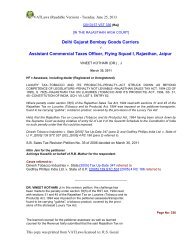

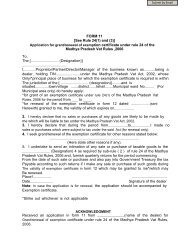
![levy of tax under vat 9b an stamp duty simultaneously[1] - RS Goyal ...](https://img.yumpu.com/45559052/1/158x260/levy-of-tax-under-vat-9b-an-stamp-duty-simultaneously1-rs-goyal-.jpg?quality=85)
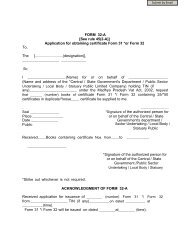
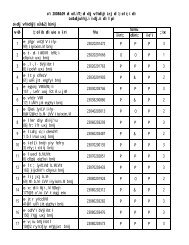
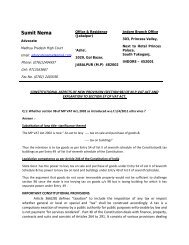
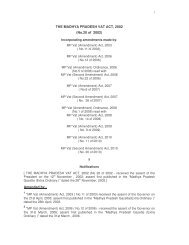
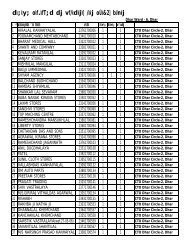
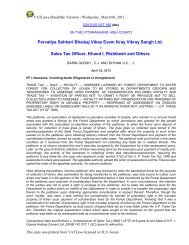
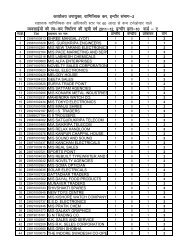
![[2012] 54 VST 26 (P and H) - RS Goyal & Associates](https://img.yumpu.com/38348208/1/190x245/2012-54-vst-26-p-and-h-rs-goyal-associates.jpg?quality=85)
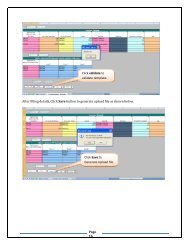
![[2012] 47 VST 379 (Ker) - RS Goyal & Associates](https://img.yumpu.com/38348087/1/190x245/2012-47-vst-379-ker-rs-goyal-associates.jpg?quality=85)